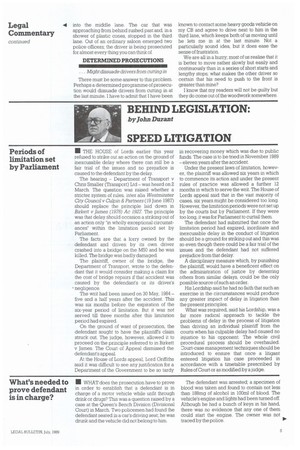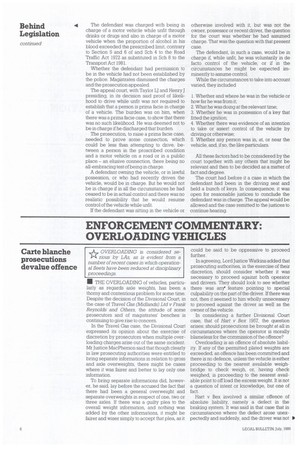BEHIND LEGISLATION:
Page 113

Page 114

If you've noticed an error in this article please click here to report it so we can fix it.
by John Durant
SPEED LITIGATION
MI THE HOUSE of Lords earlier this year refused to strike out an action on the ground of inexcusable delay where there can still be a fair trial of the issues and no prejudice is caused to the defendant by the delay.
The hearing Department of Transport v Chris Smaller (Transport) Ltd was heard on 2 March. The question was raised whether a stricter system of rules, inter alia Westminster City Council v Culpin & Partners (19 June 1987) should replace the principle laid down in Birkett v James (1978) Ac 1927 The principle was that delay should occasion a striking out of an action only "in wholly exceptional circumstances.' within the limitation period set by Parliament.
The facts are that a lorry owned by the defendant and driven by its own driver crashed into a bridge on the M50 and he was killed. The bridge was badly damaged.
The plaintiff, owner of the bridge, the Department of Transport, wrote to the defendant that it would consider making a claim for the cost of bridge repairs if that accident was caused by the defendant's or its driver's • negligence.
The writ had been issued on 30 May, 1984 five and a half years after the accident. This was six months before the expiration of the six-year period of limitation. But it was not served till three months after this limitation period had expired.
On the ground of want of prosecution, the defendant sought to have the plaintiffs claim struck out. The judge, however, allowed it to proceed on the principle referred to in Birkett v James. The Court of Appeal dismissed the defendant's appeal.
At the House of Lords appeal, Lord Griffiths said it was difficult to see any justification for a Department of the Government to be so tardy 111 WHAT does the prosecution have to prove in order to establish that a defendant is in charge of a motor vehicle while unfit through drink or drugs? This was a question raised by a case at the Queen's Bench Division (Divisional Court) in March. Two policemen had found the defendant seated in a car's driving seat; he was drunk and the vehicle did not belong to him. in recovering money which was due to public funds. The case is to be tried in November 1989 eleven years after the accident.
Under the present laws of limitation, however, the plaintiff was allowed six years in which to commence its action and under the present rules of practice was allowed a further 12 months in which to serve the writ. The House of Lords appeal said that in the vast majority of cases, six years might be considered too long. However, the limitation periods were not set up by the courts but by Parliament. If they were too long, it was for Parliament to curtail them.
The defendant had submitted that once the limitation period had expired, inordinate and inexcusable delay in the conduct of litigation should be a ground for striking out arid this was so even though there could be a fair trial of the issues and the defendant had not suffered prejudice from that delay.
A disciplinary measure which, by punishing the plaintiff, would have a beneficent effect on the administration of justice by deterring others from similar delays, could be the only possible source of such an order.
His Lordship said he had no faith that such an exercise in the circumstances would produce any greater impact of delay in litigation than the present principles.
What was required, said his Lordship, was a far more radical approach to tackle the problems of delay in the process of litigation than driving an individual plaintiff from the courts when his culpable delay had caused no injustice to his opponent. The whole civil procedural process should be overhauled. Court-case management techniques should be introduced to ensure that once a litigant entered litigation his case proceeded in accordance with a timetable prescribed by Rules of Court or as modified by a judge.
The defendant was arrested; a specimen of blood was taken and found to contain not less than 188mg of alcohol in 100m1 of blood. The vehicle's engine and lights had been turned off Although he had a bunch of keys in his hand, there was no evidence that any one of them could start the engine. The owner was not traced by the police. • 4 The defendant was charged with being in charge of a motor vehicle while unfit through drinks or drugs and also in charge of a motor vehicle when the proportion of alcohol in his blood exceeded the prescribed limit, contrary to Section 5 and 6 of and Sch 4 to the Road Traffic Act 1972 as substituted in Sch 8 to the Transport Act 1981.
Whether the defendant had permission to be in the vehicle had not been established by the police. Magistrates dismissed the charges and the prosecution appealed.
The appeal court, with Taylor 14 and Henry J presiding, in its decision said proof of likelihood to drive while unfit was not required to establish that a person is prima facie in charge of a vehicle. The burden was on him, when there was a prima facie case, to show that there was no such likelihood. He was deemed not to be in charge if he discharged that burden.
The prosecution, to raise a prima facie case, needed to prove some connection, which could be less than attempting to drive, between a person in the proscribed condition and a motor vehicle on a road or in a public place — an elusive connection, there being no all-embracing test of being in charge.
A defendant owning the vehicle, or in lawful possession, or who had recently driven the vehicle, would be in charge, But he would not be in charge if in all the circumstances he had ceased to be in actual control and there was no realistic possibility that he would resume control of the vehicle while unfit.
If the defendant was sitting in the vehicle or otherwise involved with it, but was not the owner, possessor or recent driver, the question for the court was whether he had assumed charge. That was the question with that present case.
The defendant, in such a case, would be in charge if, while unfit, he was voluntarily in de facto control of the vehicle, or if in the circumstances he might be expected imminently to assume control.
While the circumstances to take into account varied, they included 1. Whether and where he was in the vehicle or how far he was from it; 2. What he was doing at the relevant time; 3. Whether he was in possession of a key that fitted the ignition; 4. Whether there was evidence of an intention to take or assert control of the vehicle by driving or otherwise; 5. Whether any person was in, at, or near the vehicle, and, if so, the like particulars.
All these factors had to be considered by the court together with any others that might be relevant and then to be decided as a matter of fact and degree.
The court had before it a case in which the defendant had been in the driving seat and held a bunch of keys. In consequence, it was open for reasonable justices to conclude the defendant was in charge. The appeal would be allowed and the case remitted to the justices to continue hearing.




















































































































